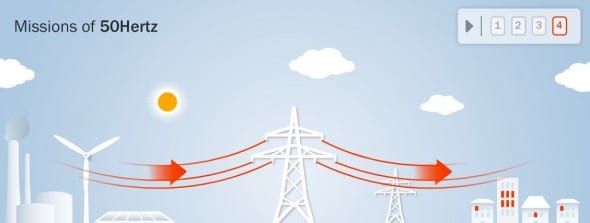Grid Operator: 70% Solar + Wind On German Grid Before Storage Needed
Editor’s Note: Giles has landed some great soundbites from and an interview with Boris Schucht, the CEO of 50 Hertz, a German grid operator. If that name rings a bell, you probably saw the video I published about him talking about the same matter in Abu Dhabi earlier this year. If not, I am including that video again for you below. A lot of people like to toss around their armchair ideas for how to integrate renewables into the grid, or how it “can’t be done.” Boris knows this topic like the back of his hand — it’s what he does. So, I think it’s particularly important to listen to his point of view. The bottom line, though, is right there in the title: we can integrate a ton of wind and solar power into the grid before storage is needed. Here’s that video I recorded in Abu Dhabi, followed by the new article and interview from Giles:
The company responsible for more than one-third of Germany’s electricity grid says there is no issue absorbing high levels of variable renewable energy such as wind and solar, and grids could absorb up to 70 per cent penetration without the need for storage.
Boris Schucht, the CEO of 50 Hertz, which operates the main transmission lines in the north and east of Germany – and which is 40 per cent owned by Australia’s Industry Funds Management – says the industry’s views of renewable energy integration has evolved rapidly in the past decade.
“It’s about the mind-set,” Schucht said at the Re-energising the Future conference in Paris, and later to RenewEconomy.
“10 to 15 years ago when I was young engineer, nobody believed that integrating more than 5 per cent variable renewable energy in an industrial state such as Germany was possible.”
Yet, Schucht says, in the region he is operating in, 42 per cent of the power supply (in output, not capacity), came from wind and solar – about the same as South Australia. This year it will be 46 per cent, and next year it will be more than 50 per cent.
“No other region in the world has a similar amount of volatile renewable energy ….. yet we have not had a customer outage. Not for 35 or 40 years.”
Schucht conceded that Germany, which through its Energiewende (energy transitions) has pioneered the push into variable renewable energy, made some mistakes in the early years, particularly in relation to the management of rooftop solar PV. But at that time, the penetration rate was low and renewables was only a niche market.
He points to the changes made since then as proof that the integration is posing no issues. In the solar eclipse earlier this year, a ramp down of more than 10GW of solar PV and ramp up of 14GW of solar PV (both within minutes) were handled by the market with no need for intervention.
“We believed in the market and education of market,” Schucht said. “We did not need to interfere. It was done by itself.”
Because of this, Schucht believes that integration of 60 to 70 per cent variable renewable energy – just wind and solar – could be accommodated within the German market without the need for additional storage. Beyond that, storage will be needed.
Schucht later told RenewEconomy that even higher levels of renewable energy could be absorbed. But before the grid went to 100 per cent renewable energy, he thought that attention should be turned to ensuring there was more renewable energy in the transport and heating sectors.
Have a tip for CleanTechnica? Want to advertise? Want to suggest a guest for our CleanTech Talk podcast? Contact us here.
Latest CleanTechnica.TV Video

CleanTechnica uses affiliate links. See our policy here.

